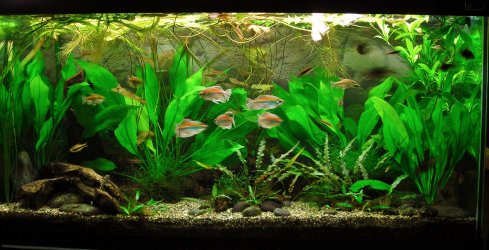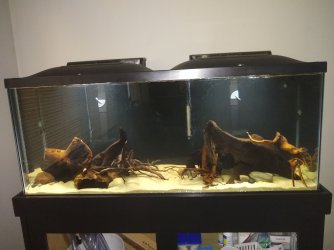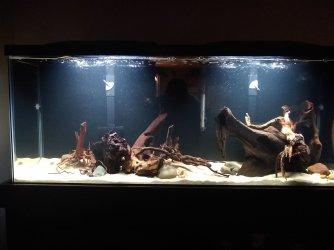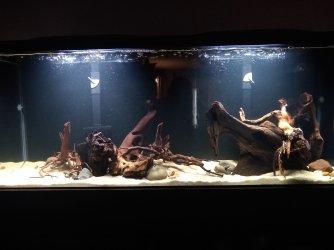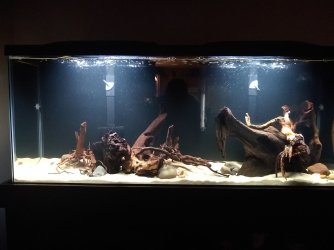🌟 Exclusive Amazon Black Friday Deals 2024 🌟
Don’t miss out on the best deals of the season! Shop now 🎁
You are using an out of date browser. It may not display this or other websites correctly.
You should upgrade or use an alternative browser.
You should upgrade or use an alternative browser.
Stocking my 55 gal Tank... Advice Please! :)
- Thread starter dmpfishlover
- Start date
Hhmmm... Ive heard of many people keeping Rummy nose with Harlequin Rasboras before? I'm on the fence about Cardinal or Neon Tetras... I honestly would prefer the Cardinal over the Neon, but I might rule them out becuase I have heard they do require pretty specific water parameters (namely Temp, pH et.) and are sensitive to changes. I will definitely wait to add Oto's until the tank is "mature", if I do decide to go with that species. Thanks for the advice!!
A few words about "active fish" may help here. There are varying degrees to "active" swimming. Most of the barbs and danios are active or very active fish, and these should never be housed with sedate fish like cichlids or gourami, nor more sedate shoaling fish like some of the characins and rasboras. Then there is the rummynose...this is a somewhat active swimmer but not at all in the same class as the danios and barbs. The active swimming of a shoal of rummynose is generally as a group doing "lengths" in the tank. Zebra danios for an obvious contrast are jumping and flitting about all over the place. If that makes any sense. Rummynose could be housed with discus, but danios and barbs definitely not.
Harlequin Rasbora (Trigonostigma heteromorpha) is a tad more active that the two closely related species T. espei and T. hengeli, but not so active as to be problems with the other fish here. And I would not hesitate to combine any of these rasbora with rummynose. I have had (until now) a shoal of Hemigrammus bleheri (the more common "rummy" now) and once the "false" rummy Petitella georgiae. These were in a 5-foot tank with somewhat less active tetras, 50-60 Corydoras, and hatchetfish (Carnegiella strigata, one of the quietest hartchets). The rummys need a good group, 20-25 is advisable.
Cardinals (Paracheirodon axelrodi) or neons (P. innesi)...keep temperature in mind, in relation to the other fish. The neons are cooler in general, and the cardinals do better above the neon's temperature. If you have cories you do not want to go too high in temperature. Neons prefer the lower half of the water column, with the rummys and cories. Cardinals a tad higher, close to the rasboras which are mid-tank level.
Last edited:
dmpfishlover
Fishaholic
This is VERY valuable information!! Thank you so much!! I have pretty much ruled out the Cardinal tetra after all of the advice I have received... I may include Neon Tetras, but then again, I may end up going with a different Tetra instead... There are a few Tetras that I know I do NOT want based on my experiences and that is the Serpae and Black Skirt Tetras... I have kept both types of Tetras in the past and found them to be somewhat aggressive/territorial and a bit nippy (fin nippers)... So, either I will go with Neons, or come up with another Tetra candidate (Suggestions are always welcome!)... Thankfully I have plently of time (several weeks) to consider all of my options, as my fishless cycling will take another 4-6 weeks or so.A few words about "active fish" may help here. There are varying degrees to "active" swimming. Most of the barbs and danios are active or very active fish, and these should never be housed with sedate fish like cichlids or gourami, nor more sedate shoaling fish like some of the characins and rasboras. Then there is the rummynose...this is a somewhat active swimmer but not at all in the same class as the danios and barbs. The active swimming of a shoal of rummynose is generally as a group doing "lengths" in the tank. Zebra danios for an obvious contrast are jumping and flitting about all over the place. If that makes any sense. Rummynose could be housed with discus, but danios and barbs definitely not.
Harlequin Rasbora (Trigonostigma heteromorpha) is a tad more active that the two closely related species T. espei and T. hengeli, but not so active as to be problems with the other fish here. And I would not hesitate to combine any of these rasbora with rummynose. I have had (until now) a shoal of Hemigrammus bleheri (the more common "rummy" now) and once the "false" rummy Petitella georgiae. These were in a 5-foot tank with somewhat less active tetras, 50-60 Corydoras, and hatchetfish (Carnegiella strigata, one of the quietest hartchets). The rummys need a good grop, 20-25 is advisable.
Cardinals (Paracheirodon axelrodi) or neons (P. innesi)...keep temperature in mind, in relation to the other fish. The neons are cooler in general, and the cardinals do better above the neon's temperature. If you have cories you do not want to go too high in temperature. Neons prefer the lower half of the water column, with the rummys and cories. Cardinals a tad higher, close to the rasboras which are mid-tank level.
Ember tetras are great. I've always wanted penguin tetras as well.This is VERY valuable information!! Thank you so much!! I have pretty much ruled out the Cardinal tetra after all of the advice I have received... I may include Neon Tetras, but then again, I may end up going with a different Tetra instead... There are a few Tetras that I know I do NOT want based on my experiences and that is the Serpae and Black Skirt Tetras... I have kept both types of Tetras in the past and found them to be somewhat aggressive/territorial and a bit nippy (fin nippers)... So, either I will go with Neons, or come up with another Tetra candidate (Suggestions are always welcome!)... Thankfully I have plently of time (several weeks) to consider all of my options, as my fishless cycling will take another 4-6 weeks or so.
dmpfishlover
Fishaholic
Great suggestions!!! I like the look of Ember Tetras.Ember tetras are great. I've always wanted penguin tetras as well.
They are smaller fish than neons so I would do a larger groups of at least 20Great suggestions!!! I like the look of Ember Tetras.
dmpfishlover
Fishaholic
Yes, awesome idea!!They are smaller fish than neons so I would do a larger groups of at least 20
Willbacon23
Fishaholic
They are smaller fish than neons so I would do a larger groups of at least 20
do you have any photos of your tanks. You seem so organised and on it I’d love to see what you end up producing can only imagine woukd be inspirationA few words about "active fish" may help here. There are varying degrees to "active" swimming. Most of the barbs and danios are active or very active fish, and these should never be housed with sedate fish like cichlids or gourami, nor more sedate shoaling fish like some of the characins and rasboras. Then there is the rummynose...this is a somewhat active swimmer but not at all in the same class as the danios and barbs. The active swimming of a shoal of rummynose is generally as a group doing "lengths" in the tank. Zebra danios for an obvious contrast are jumping and flitting about all over the place. If that makes any sense. Rummynose could be housed with discus, but danios and barbs definitely not.
Harlequin Rasbora (Trigonostigma heteromorpha) is a tad more active that the two closely related species T. espei and T. hengeli, but not so active as to be problems with the other fish here. And I would not hesitate to combine any of these rasbora with rummynose. I have had (until now) a shoal of Hemigrammus bleheri (the more common "rummy" now) and once the "false" rummy Petitella georgiae. These were in a 5-foot tank with somewhat less active tetras, 50-60 Corydoras, and hatchetfish (Carnegiella strigata, one of the quietest hartchets). The rummys need a good grop, 20-25 is advisable.
Cardinals (Paracheirodon axelrodi) or neons (P. innesi)...keep temperature in mind, in relation to the other fish. The neons are cooler in general, and the cardinals do better above the neon's temperature. If you have cories you do not want to go too high in temperature. Neons prefer the lower half of the water column, with the rummys and cories. Cardinals a tad higher, close to the rasboras which are mid-tank level.
do you have any photos of your tanks. You seem so organised and on it I’d love to see what you end up producing can only imagine woukd be inspiration
Most of the photos I've taken over the last decade have few fish in them because my fish do not like being bothered and when I enter the fish room they disappear. I sit in my easy chair and they reappear, but at the first sight of the camera they are gone again! That is one problem with a dedicated fish room, the fish get used to the quiet (no human activity). And my camera was not very good so qual;ity is poor.
Photo 1 is my former 5-foot 115g Amazon riverscape. Photo 2 is the 70g flooded Amazon aquascape the day after I set it up, or rather re-set it, before the fish went in that day. Photo 3 is an authentic Sri Lanka Stream Black Ruby Barb biotope. Photo 4 is the 90g Riverscape. Then to the present, I downsized when I moved last year and got rid of all those larger tanks; these photos were taken yesterday/today with my new Smartphone so still learning how to use it!. Photo 5 is my 40g South American tank primarily designed for my 41 Corydoras, with 12 pencilfish living out their senior years. Photo 6 is a 20g I threw together a couple weeks back and moved my Trigonostigma hengeli into.
Attachments
dmpfishlover
Fishaholic
I found it hard to really get a good picture because of the glare on the glass, bit here is how it looks so far Just Driftwood and Stone for now. One the fishless cycle is complete I will be adding a bunch of Live plants and the first fish. I painted the back of the tank black and my husband built the stand which I painted black to match the rim and hood of the tank (he still has to make the stand doors lol)do you have any photos of your tanks. You seem so organised and on it I’d love to see what you end up producing can only imagine woukd be inspiration
Attachments
dmpfishlover
Fishaholic
Awesome Tanks!!! Beautiful... I can't wait to add plants!! And fish of course... I just think live plants take an Aquarium to the whole next level!Most of the photos I've taken over the last decade have few fish in them because my fish do not like being bothered and when I enter the fish room they disappear. I sit in my easy chair and they reappear, but at the first sight of the camera they are gone again! That is one problem with a dedicated fish room, the fish get used to the quiet (no human activity). And my camera was not very good so qual;ity is poor.
Photo 1 is my former 5-foot 115g Amazon riverscape. Photo 2 is the 70g flooded Amazon aquascape the day after I set it up, or rather re-set it, before the fish went in that day. Photo 3 is an authentic Sri Lanka Stream Black Ruby Barb biotope. Photo 4 is the 90g Riverscape. Then to the present, I downsized when I moved last year and got rid of all those larger tanks; these photos were taken yesterday/today with my new Smartphone so still learning how to use it!. Photo 5 is my 40g South American tank primarily designed for my 41 Corydoras, with 12 pencilfish living out their senior years. Photo 6 is a 20g I threw together a couple weeks back and moved my Trigonostigma hengeli into.
I found it hard to really get a good picture because of the glare on the glass, bit here is how it looks so far Just Driftwood and Stone for now. One the fishless cycle is complete I will be adding a bunch of Live plants and the first fish. I painted the back of the tank black and my husband built the stand which I painted black to match the rim and hood of the tank (he still has to make the stand doors lol)
That is some nice wood. If I may be permitted, a couple of observations. When you have two focal points (the wood arrangements here) it is best not to have them equally spaced in relation to the tank sides. This draws attention to the rectangle and the space visually seems smaller. Even when plants and fish are present, it will still appear this way. Shift one of the two focal points a bit toward the centre so there is some obvious space between that focal point and the end wall, whichever piece you decide to shift. It doesn't take much, but it will serve to hide the "box" effect that an aquarium has.
The sixth photo in my post #24 illustrates what I am getting at. The left standing chunk of wood is in from the tank wall, and the right standing wood is against the opposite end wall. The third chunk slightly behind does help this illusion too, so the effect is two focal points that are not equidistant from anything.
The other suggestion is when taking photos, never use the flash. That should eliminate glass reflection. And when fish are present, flash pictures do stress them, sometimes seriously. All of my photos above were taken without flash.
dmpfishlover
Fishaholic
Thanks for the advice... I may try to move things around a bit to "play" around with perceptions and focal points. It will definitely be easier to do that now, while there are no plants or fish in the tank. I took some pictures with the flash, and then realized I was getting a glare, so I took more without the flash (only one of the pictures I posted was taken with the flash)... As I don't have any fish in the tank yet, I was not concerned with scaring fish. Unfortunately, with or without the flash, I wasn't able to get a really good picture ... I don't have the best camera.That is some nice wood. If I may be permitted, a couple of observations. When you have two focal points (the wood arrangements here) it is best not to have them equally spaced in relation to the tank sides. This draws attention to the rectangle and the space visually seems smaller. Even when plants and fish are present, it will still appear this way. Shift one of the two focal points a bit toward the centre so there is some obvious space between that focal point and the end wall, whichever piece you decide to shift. It doesn't take much, but it will serve to hide the "box" effect that an aquarium has.
The sixth photo in my post #24 illustrates what I am getting at. The left standing chunk of wood is in from the tank wall, and the right standing wood is against the opposite end wall. The third chunk slightly behind does help this illusion too, so the effect is two focal points that are not equidistant from anything.
The other suggestion is when taking photos, never use the flash. That should eliminate glass reflection. And when fish are present, flash pictures do stress them, sometimes seriously. All of my photos above were taken without flash.
dmpfishlover
Fishaholic
I took your advice and moved the driftwood in my tank around today and I think it looks a lot better. As soon as I rearranged things, I realized what you were talking about! Thank you so much for the suggestions. I will post updated pictures later...I will wait to take pictures u til after dark.. Right now there is just too much sunlight coming through the windows, even with the blinds closed..so there is some glare coming from the glass.That is some nice wood. If I may be permitted, a couple of observations. When you have two focal points (the wood arrangements here) it is best not to have them equally spaced in relation to the tank sides. This draws attention to the rectangle and the space visually seems smaller. Even when plants and fish are present, it will still appear this way. Shift one of the two focal points a bit toward the centre so there is some obvious space between that focal point and the end wall, whichever piece you decide to shift. It doesn't take much, but it will serve to hide the "box" effect that an aquarium has.
The sixth photo in my post #24 illustrates what I am getting at. The left standing chunk of wood is in from the tank wall, and the right standing wood is against the opposite end wall. The third chunk slightly behind does help this illusion too, so the effect is two focal points that are not equidistant from anything.
The other suggestion is when taking photos, never use the flash. That should eliminate glass reflection. And when fish are present, flash pictures do stress them, sometimes seriously. All of my photos above were taken without flash.
dmpfishlover
Fishaholic
Here are some pictures of the tank after moving the driftwood aroundThat is some nice wood. If I may be permitted, a couple of observations. When you have two focal points (the wood arrangements here) it is best not to have them equally spaced in relation to the tank sides. This draws attention to the rectangle and the space visually seems smaller. Even when plants and fish are present, it will still appear this way. Shift one of the two focal points a bit toward the centre so there is some obvious space between that focal point and the end wall, whichever piece you decide to shift. It doesn't take much, but it will serve to hide the "box" effect that an aquarium has.
The sixth photo in my post #24 illustrates what I am getting at. The left standing chunk of wood is in from the tank wall, and the right standing wood is against the opposite end wall. The third chunk slightly behind does help this illusion too, so the effect is two focal points that are not equidistant from anything.
The other suggestion is when taking photos, never use the flash. That should eliminate glass reflection. And when fish are present, flash pictures do stress them, sometimes seriously. All of my photos above were taken without flash.
Attachments
Similar threads
- Replies
- 12
- Views
- 485





